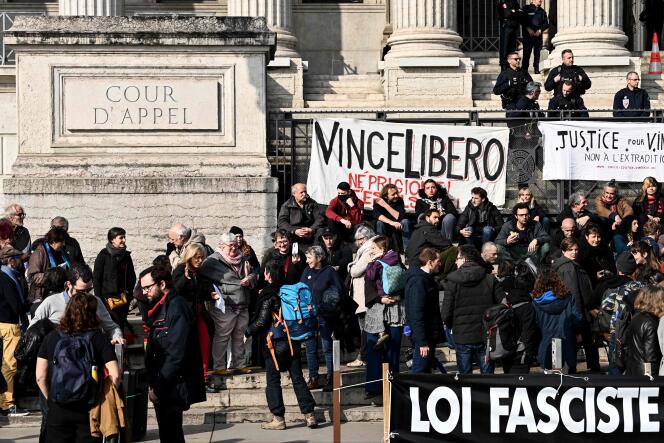
In his novel Three Horses, the Italian writer Erri De Luca imagines a character who flees the military dictatorship in Argentina. "I don't even know if I'm still being investigated for those years. There are no more little soldiers in the government but the laws are odd and we probably forget they're on the books, just like that, as a distraction," says the never-in-peace fugitive.
This fiction appeared to become reality in the courtroom of the Lyon Court of Appeal on Friday, February 24. Vincenzo Vecchi, 49, rolled his worried gaze around the chamber where his fate was being decided, staring at the small luminous sign that indicates the emergency exit, upstairs, to the left of the magistrates.
Established in Brittany for 10 years, the man with a bald head, round glasses and a small grey mustache, is the subject of a European arrest warrant for offenses that date back more than 20 years. The Italian government is seeking to bring back Vecchi, who was sentenced to 12 and a half years in prison, for his participation in an anti-G8 demonstration in Genoa in 2001.
The case is causing concern to many law experts and intellectuals, friends and relatives who have gathered in a support committee. Many came to the steps of the court's entrance last week to show support.
The European arrest warrant issued by Italy is based on the principle of the so-called "devastation and looting" law written in 1930 by Benito Mussolini's fascist regime. It consists in repressing the mere presence at a demonstration, without necessarily having to prove acts of violence or degradation.
In 2001 in Genoa, demonstrations against the G8 were marked by the actions of violent groups and followed by brutal police repression that involved acts of torture. They were condemned by the European Court of Human Rights. A young demonstrator was killed and hundreds were injured.
The following year, Italian authorities decided to prosecute 10 demonstrators, known as the "Genoa Ten." Among them, Vecchi was accused of "violence, theft and damage by fire" on the basis of photographs.
Pictures show him with a construction board, not far from a barricade, then drinking a can near a looted supermarket or near burned tires. The material was gathered under the indictment of "devastation and looting."
After a year of pre-trial detention, in 2002, Vecchi fled. He did not wait for the final sentence which was pronounced in 2012 by the Italian Supreme Court of Cassation: 12 and a half years in prison.
'Misused' European arrest warrant
You have 49.14% of this article left to read. The rest is for subscribers only.